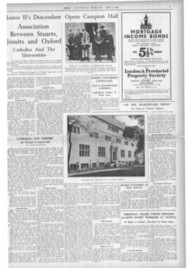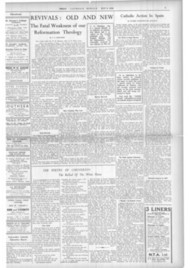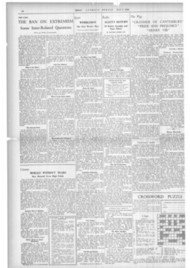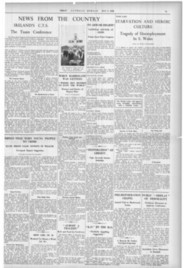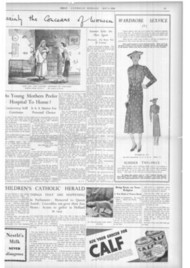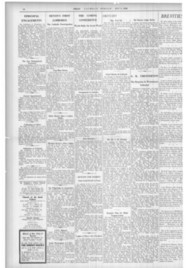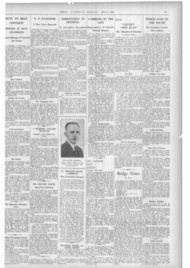Page 5, 3rd July 1936
Page 5

Report an error
Noticed an error on this page?If you've noticed an error in this article please click here to report it.
Tags
Share
Related articles
N Ew Chaplain For Oxford Undergraduates Fr. Alfonso...
Towards A Catholic Society
Letters To The
English Catholics' Gifts To Spain
Civil War In Spain
Catholic Action In Spain
By FATHER ALPHONSUS DE ZULUETA.
Though Catholic Action, in the strict sense, had actually been started in Spain, as elsewhere, before the Revolution of 1931, it is from that time that it has acquired the vigour and strong characteristics which enable many to predict that, given time, Spain may rank at the head of all other nations in Catholic Action.
The Work of Angel Herrera This is due, in the first place, to the work of one layman, Don Angel Herrera, President of the National Board until his recent departure for Fribourg to study for the priesthood.
Acting under the guidance of Rome, and with the support of the Spanish Hierarchy, he gave Spanish Catholic Action its definite form and character. For many years Senor Herrera had been preparing a movement whose spirit closely coincided with the future Catholic Action, and which was to form the nucleus and pattern for that organisation in Spain.
The long and gradual process of spiritual decay which was to culminate in the Revolution had preoccupied Senor Herrera and a few others since they were very young men, and they were the first to see that if ever Spain were to recover her former greatness and lead the way in Catholic Europe once more, it could only be by a complete renewal of the Christian spirit in her midst.
Thus was born the Asociacion de Propagandistas, a devoted band of laymen, not without something of the spirit of Inigo de Loyola and his companions when they scaled the hill of Montmartre for the first time.
A spiritual and intellectual elite, their aim has been to leaven the mass and to cultivate minorities and small groups, instilling into them their own fervour and devoting themselves to apostolic work in every form, catechising, engaging in social work and 'even in politics as individuals. It is no secret that Senor Gil one,, of, their number; and indeed the wog of this great gentleman becomes the more intelligible when it is seen as simply the overflow of an intensely spiritual concept of life.
First and foremost in Catholic. Action stands the principle of self formation; no active work is of the slightest use without an intense spiritual life. You cannot give what you have not got. Hence, training comes before all, and this principle of practical mysticism was hardly likely to be lost sight of in the land of Teresa and John of the Cross.
The Fight Against Liberalism
The ground was well prepared amongst a select minority for the coming of Catholic Action in Spain. But the hard work came when it was a question of reaching the majority, in all classes, and of re-educating their Catholic sense. Liberalism had done its work all too well, and there were many Catholics who should have known better who proved difficult to bring into line and who showed an obstinate and exaggerated individualism.
This individualism had been the ruin of both religion and patriotism in Spain, and it was the first task of Catholic Action to react against it, by building up' something strongly national and Catholic at the same time, and appealing to the traditional Spanish loyalty towards Rome and all tire implications of Papal teaching.
The response, on the whole, was generous, though only time can show how far it will reach the whole .country. But a great asset in Spain certainlj, is the identification throughout Spanish history of nationalism And Catholicism, and the fact that the essence of Spain is Catholicity.
" Weeks " of Catholic Action Acting on this principle, .the National Board has concentrated on stirring up in Spain, in the very face of the unpatriotic and dissolvent forces of Socialism, a campaign of national , and Catholic reconstruction, by means of Weeks held in the provincial capitals amidst the monuments of Spain's grandeur, taking one national and local. figure after another and drawing attention to his place in the historical or literary or artistic perspective of Spain as, first and foremost, an example of her unrivalled Catholicism.
then, the creation in Madrid of a Centre of University Studies, a kind of Institut Catholique, to supplement the nonCatholic and extremely partial training in the State Universities, and this is completed by the Summer Course in Santander, which is open to foreigners, and , which aims at continuing this specifically Catholic and Spanish cultural movement. There is also a course of an interna,tional nature at San Sebastian, where it -is hoped to effect an interchange of ideas • between Spanish and foreign Catholics.
The Catholic University also at the preparation of men who Will be able 'to" take their place in the Chairs of the State Universities, and thus, by sheer intellectual worth and persuasion, gradually effect the re7conquest of the Spanish mind, so tragicallycut adrift by the irreligious and unSpanish propaganda of night two hundred years from its native tradition and climate.
Spain is to be, once again, through Catholic Action, a land of saints and of theologians, and with all that she has managed to keep by way of tradition and family life and Catholic heritage, she may yet point the way to a disconcerted Europe.
Next to this comes the Secretariates for all the Catholic Trade Unions. The reconquest of the masses through the Encyclicals is the other great preoccupation of Spanish Catholic Action.
The National Board also helps all the main Catholic works of the country, such as the Press, which the " Debate," again under Herrera, has made a force, the Seminaries, and the training of the Ecclesiastical Assistants, most delicate of posts, to which it is understood that Herrera will devote himself specially as a priest. They are the link in each diocese and parish between the Hierarchy and the laity, and though they do not preside, their presence is essential, and it is on them that the spirit and mentality of Catholic Action in the first place depends.
A keen, interested, and highly educated type of young priest is emerging from these centres, and the day of the sleepy though amiable old " curas " are numbered!
Training for Youth
The Diocesan Boards greatly vary in efficiency in different places. Their chief work, of course, is to supervise the work in the parishes. These, after all, are the units of Catholic Action. Parochial life in Spain had been rather slack on the whole; in some parts the statistics are appalling, whole towns, especially in Andalusia, which could hardly justify the existence of one large church in their midst, yet in many of these towns there were men and boys who had been excellently schooled by the religious orders.
The trouble comes later, through lack of after care in the parishes. They need a thorough spiritual and intellectual training. And it is precisely this which Catholic Action provides, for all classes and conditions, training suitable to the post: integral and all embracing, comprising the mind and the will and the emotions, imparting true discipline in the best sense of the word.
This is the field of the Youth Groups, and in Spain it was much needed, to combat human respect and widespread ignorance. The response amongst the Catholic section of youth has been tremendous. After assisting at a Study Circle one realises what it is to have theology, a Spaniard's heritage, in the blood. And the genuine piety shown in the collective acts and by the whole spirit of the movement, is of a very fine and virile type. I think the Spaniard, once roused, makes straight for the essence of things spiritual. One does not need to decoy him with other baits, though physical exercise and sport have their place and are increasingly popuular, good substitute for bull 'fights. But there scenas-ta-ba-no limit to_ th.e....self, sacrifice-of-these-yenngapastlet,whrrgive up most of their free time to works pf Catholic ActictrA.-if they be -officials to the management, and in any case to the work of catechising children, visiting the sick, and in other ways assisting the parish priest in his ministry.
But the burden of active work falls on the men's and women's branches; the period of youth is essentially one of growth in spiritual and intellectual life, and impatience is easily curbed once it is grasped that the whole work is essentially supernatural, work for God, in which self-seeking has no place.
Apart from these austerer principles, the Juventud Catholica of Spain is about as healthy and happy a body as can be found anywhere, and perhaps as a result of their intense spiritual formation. One may mention the remarkable spirit of charity which saves a movement which might otherwise so easily be perverted into class hatred, so intensely social is it, so ardent for reform, and yet such a spirit is rarely seen, and if it appears, soon corrected.
National Congress of 1937 Finally, the great National Congress of Catholic Youth which is planned for July, 1937, to celebrate the Holy Year at Compostela (St. James' Coming to Spain), will see a magnificent rally of Spanish youth: and it is hoped that many will come from other countries, too. Spain wishes to re'gain her Catholicity, but with it that universality which always goes with true Catholicity, and of which Spain gave such fine examples in her Golden Age.
In her Catholic Youth she hopes to show Europe what Spain still has to give, and the future lies with them. They alone, under God, can save Spain.
blog comments powered by Disqus




